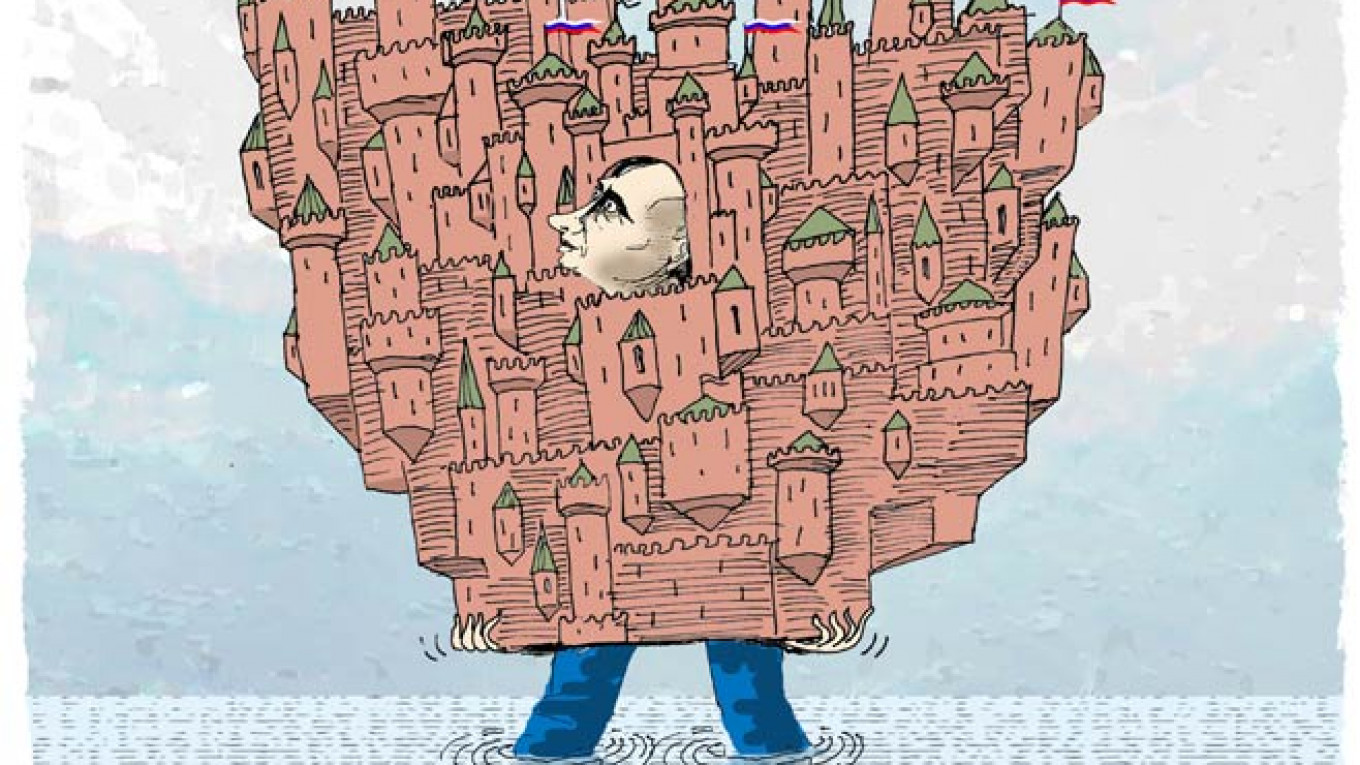During the 23 years since the collapse of the Soviet Union, Russian public opinion and the mindset of its ruling elite have gone from a generally pro-European liberal orientation in the 1980s and 1990s to a gradual revival of the idea of Russia as a great power in the late 1990s — especially after the NATO bombing of Yugoslavia and the first Chechen war.
Putin has firmly set Russia on the path toward restoring its superpower status based on an anti-Western and nationalist state ideology.
President Vladimir Putin skillfully rode that wave of change by building his power vertical and a foreign policy that claimed Russia was "getting up off its knees." His first decade in power was marked by economic growth and a consumer boom in exchange for a crackdown on individual freedoms and an expanded role for the state in politics and the economy. After the quick victory in the war against Georgia in 2008 and the swift annexation of Crimea, Putin has firmly set Russia on the path toward restoring its superpower status based on an anti-Western and nationalist state ideology.
Putin delivered a keynote speech at the meeting of the Valdai Club last September in which he proclaimed that Russians and the state are conservative at their core — unlike Europe, which he said had discarded traditional Christian values. Putin called on Russia to create an ideology based on unconditional patriotism that would have a direct impact on the country's economy, domestic politics, education and culture.
1. The economy
The State Duma passed series of laws aimed at "nationalizing the elite" and banning offshore bank accounts. Moscow leaders urged wealthy Russians to return their money to Russia and to disclose information about the true owners of offshore accounts. Ministers and Duma deputies were ordered to divest themselves of foreign bank accounts. Military spending increased sharply, including spending on arms procurement.
After the West imposed economic sanctions, Moscow accelerated the process of creating a national payment system and began looking at the possibility of placing shares of Russian companies on national stock exchanges. There is also a plan to create Russian rating agencies.
2. Domestic politics
The Kremlin expelled USAID and several U.S.-based nongovernmental organizations in 2012. Russian-based NGOs that continue to receive foreign funding have been forced by law to label themselves as "foreign agents."
What's more, a new law permits government officials to block any website and blog they deem disloyal without the need for a court order. They have already blocked the sites for Yezhednevny Zhurnal, Grani.ru, Kasparov.ru and anti-corruption activist Alexei Navalny's blog. In addition, new legislation has expanded the Federal Security Service's authority to carry out surveillance of Russians. Deputies have also passed a law granting the FSB complete access to the personal data of anyone using social networks and e-mail. The authorities' next step, independent intelligence experts believe, could be blocking or severely restricting Facebook, YouTube, Skype and Twitter in Russia. If so, Russia's level of Internet censorship and other restrictions could rival those of China and Belarus.
Lawmakers have also adopted new "anti-extremist" legislation to maximize the penalties for participating in protest rallies. Several protesters who took part in the peaceful demonstration on May 6, 2012 have already been given prison terms, and one of them, Mikhail Kosenko, has been forced by court to undergo psychiatric treatment. In addition, the law has been toughened for those who try to organize opposition activities if the authorities deem it "an appeal to extremism."
3. Education
High schools have been instructed to teach young people a new concept of history, one that inculcates patriotic sentiments toward Russia as a global power. The Russian state is presented as being the most important social and political institution in the country. Textbooks do condemn state-sponsored crimes perpetrated by earlier Russian and Soviet leaders, but the implicit message remains: The state has the right to achieve its goals at nearly any cost.
4. Culture
The draft concept for the state's new policy on culture emphasizes Russia's unique civilization. For the first time in several centuries, the Culture Ministry has officially announced that "Russia is not Europe." It also rejects the Western concept of tolerance and multiculturalism. In the end, authorities want to "cultivate" a new generation of Russians who meet the needs of the new state ideology.
Taken together, these four elements of the Kremlin's new state ideology demonstrate that it is determined to isolate Russia from the Western world, effectively ending any hope for the country's modernization.
Vladimir Ryzhkov, a State Duma deputy from 1993 to 2007, is a political analyst.
A Message from The Moscow Times:
Dear readers,
We are facing unprecedented challenges. Russia's Prosecutor General's Office has designated The Moscow Times as an "undesirable" organization, criminalizing our work and putting our staff at risk of prosecution. This follows our earlier unjust labeling as a "foreign agent."
These actions are direct attempts to silence independent journalism in Russia. The authorities claim our work "discredits the decisions of the Russian leadership." We see things differently: we strive to provide accurate, unbiased reporting on Russia.
We, the journalists of The Moscow Times, refuse to be silenced. But to continue our work, we need your help.
Your support, no matter how small, makes a world of difference. If you can, please support us monthly starting from just $2. It's quick to set up, and every contribution makes a significant impact.
By supporting The Moscow Times, you're defending open, independent journalism in the face of repression. Thank you for standing with us.
Remind me later.








